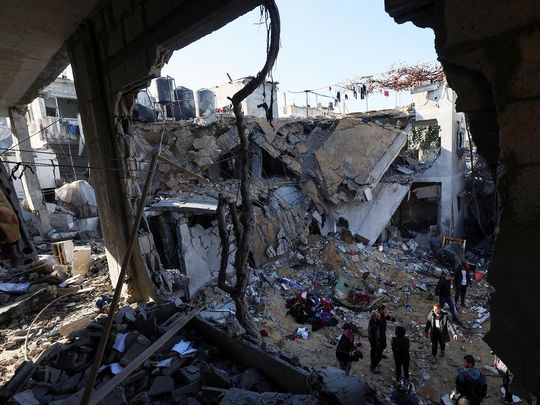
The war on Gaza has now stretched to almost four months. In the ongoing conflict, Israel’s 122-day assault on Gaza has claimed the lives of at least 27,000 Palestinians and left 66,000 others wounded. The UN has cautioned that Rafah is evolving into a “pressure cooker of despair.”
Palestinian foreign minister Riyad al-Maliki has accused Israel of carrying out “the most savage bombing campaign” since World War II, leading to famine and the massive displacement of civilians. “This is an assault of atrocities which has destroyed countless innocent lives,” he said.
UN Secretary-General, António Guterres reacting to Israeli Prime Minister Benjamin Netanyahu’s stance on Palestinian statehood warned Israel last week that Netanyahu’s rejection of a two-state solution “will indefinitely prolong a conflict that is threatening global peace and emboldening extremists everywhere.”
In his toughest language yet on the Israeli-Hamas war, the UN chief told a ministerial meeting of the UN Security Council that “the right of the Palestinian people to build their own fully independent state must be recognised by all, and a refusal to accept the two-state solution by any party must be firmly rejected.” The alternative of a one-state solution “with such a large number of Palestinians inside without any real sense of freedom, rights, and dignity … will be inconceivable,” he said.
Peace-loving Israelis who had been campaigning for a change in government before the Oct. 7 attacks have renewed their efforts to bring about a change in government. They see that the doctrine being followed by this hardliner regime has brought them no closer to peace with the Palestinians or their Arab neighbours.
Resolving Palestinian issue
Meanwhile Saudi Arabia’s foreign minister flatly rejected peace overtures with Israel under current conditions. Prince Faisal bin Farhan told CNN recently that there can be no normalisation of ties with Israel without resolving the Palestinian issue.
“That is the only way we are going to get a benefit. So, yes, because we need stability and only stability will come through resolving the Palestinian issue. What we are seeing is the Israelis are crushing Gaza, the civilian population of Gaza. This is completely unnecessary, completely unacceptable, and has to stop,” he said.
The United States, under Joe Biden, is seen as playing both sides of the fence. On the one hand, they have airlifted and shipped thousands of tons of munition that has been used in the ongoing conflict. They have vetoed calls for a ceasefire on more than one occasion, notwithstanding the human toll and suffering that tragically occurs every hour of every day while on the other, they keep playing with words to soothe Arab leaders that they indeed are playing their part to minimise the conflict.
The State Department’s undersecretary for civilian security, democracy, and human rights, told the UN council, “A key component of US diplomacy is to pursue a pathway both to a Palestinian state and normalisation and integration between Israel and other regional states.
Give peace a chance
The goal is a future where Gaza is never again used as a platform for terror, and a future where Palestinians have a state of their own.” That will not happen as long as the US keeps providing weaponry carte blanche to an Israeli regime bent on exterminating the Palestinians.
Israelis against the war, whose numbers are fortunately growing, understand that their government’s stance will only hamper real peace. One cannot force peace by occupying and subjugating a people. Elsewhere, voices among the Jewish communities in Western countries are expressing concern over the direction the current Israeli regime is headed towards.
More recently, Israeli, and American public figures numbering in the hundreds have called on US Jewish groups to speak out against the occupation of the Palestinian territories as “the elephant in the room” of Prime Minister Netanyahu’s deeply divisive administration. They know better than anyone else that lasting peace cannot be imposed by bombs but by genuine diplomacy that protects all sides.
Perhaps only when we see a regime come in that can genuinely give peace a second look, then perhaps all the chips will fall in the right places.
— Tariq A. Al Maeena is a Saudi sociopolitical commentator. He lives in Jeddah, Saudi Arabia. Twitter: @talmaeena








